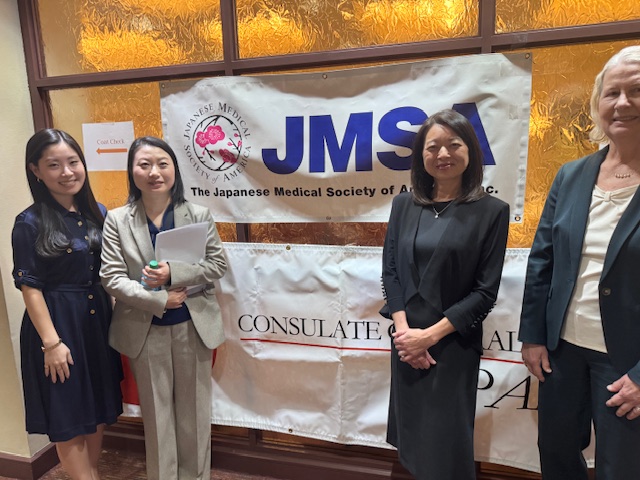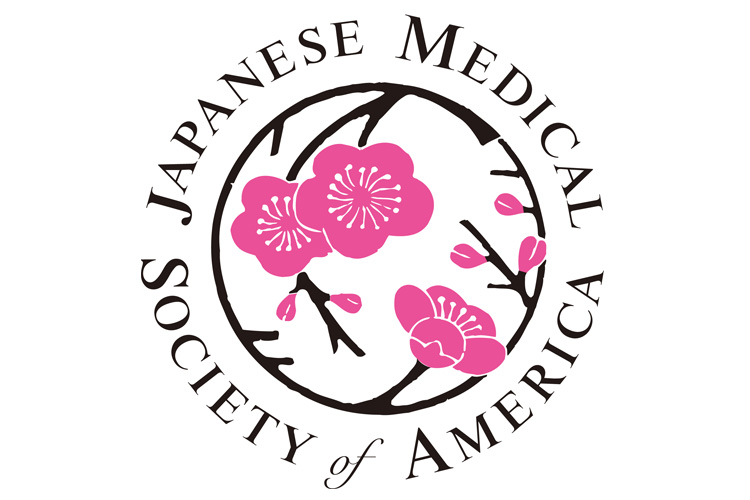On March 25th, 2025, in celebration of International Women’s Month, the Consulate and the Japanese Medical Society of America (JMSA) co-hosted an impactful Women in STEMM panel discussion, with opening remarks by Ambassador Mikio Mori. The event highlighted the pressing need to advance gender equity in science and technology fields across both the United States and Japan.
The panel featured distinguished speakers Dr. Angeliki Diane Rigos (Epistimi/MIT) and Dr. Saori Watanabe (Eisai), who candidly shared their personal journeys and insights on navigating systemic challenges such as salary disparities, the glass ceiling, and balancing career and family. The discussion was moderated by Dr. Maki Kano-Lueckerath, President of JMSA, who emphasized the critical importance of familial and institutional support in empowering women in STEMM. Serving as emcee for the evening was Ms. Haruka Kokaze of Columbia University and One Mind, who is also the 2024 recipient of the Mitsui USA Foundation Scholarship.
Key topics included cultural and structural differences in gender expectations across countries, the role of mentorship, networking, and leadership training, and how academic institutions, corporations, and governments can work together to create inclusive and supportive environments. The evening concluded with a lively Q&A session, a networking reception, and a shared commitment to deepening U.S.–Japan collaboration in empowering women to thrive in STEMM careers.
Reflections from 3 women in STEMM who attended the panel discussion:
Mia Kamiya, a premed undergraduate at the University of Washington in Seattle:
My name is Mia Kamiya, and I am a sophomore majoring in biochemistry at the University of
Washington in Seattle. As a Japanese American woman aspiring to pursue a career in medicine,
attending the Empowering Women in STEM panel was an incredibly impactful experience.
Hearing from panelists Dr. Rigos and Dr. Watanabe, as well as moderator Dr. Kano, provided
me with invaluable insight into the challenges that women in STEM face in both Japan and the
United States. From the pressures of balancing family life to being underestimated by male
colleagues, the panelists shared perspectives on solutions and the actions they took to become the
leaders they are today. I learned that there is no clear-cut path to succeeding in a STEM field, we
must overcome self-doubt to build confidence, advocate for ourselves, and create a good support
system. Beyond listening to the inspiring stories from the panel, simply being in a room full of
passionate, intelligent, and hardworking women felt empowering. In my STEM classes at
university such as physics, I have noticed that men still make up the majority. Thus, seeing so
many women in STEM together in one space was refreshing. Although we are all at different
stages in life and our careers, we share a common goal of breaking down gender norms and
thriving in STEM fields. Having the opportunity to connect with medical students and
professionals who are further along in their careers after the panel was also very insightful. As an
undergraduate student, I have so much to learn and many skills to gain. Overall, attending this
panel and being a part of this community of dedicated women in STEM, makes me feel hopeful
for the future and even more excited to continue my pursuits in medicine.
Yukina Chiba, a PhD candidate:
“I am Yukina Chiba, a Ph.D. candidate at The Rockefeller University, specializing in the study of
social behaviors and their underlying neuromolecular mechanisms. One of the primary
motivations for my decision to pursue a Ph.D. in the United States was the limited presence of
role models within the Japanese academic system. Attending an event with over 60 Japanese
women in STEMM, spanning diverse career stages and sectors, was truly eye-opening. A
particularly impactful moment from the panel was the reframing of “imposter syndrome” as a
“pioneering factor,” which profoundly shifted my perspective. I came to understand that fostering
a systematic understanding of social issues, including the underrepresentation of women in
STEMM, combined with a positive mindset, is crucial for empowering a minority to thrive in
professional environments.”
Mariko Kanai, Post Doctoral Scientist:
I am a postdoctoral scientist in Dr. Jeremy Rock’s laboratory at The Rockefeller University,
where I study tuberculosis. I appreciated the insightful panel discussion, which addressed the
most pressing issues for women in STEM and offered a perfect balance between honest,
inspiring personal stories and practical advice. I also valued the opportunity to connect with
other Japanese women in STEM. Key takeaways include the importance of proactively
expressing interest in leadership opportunities, advocating for yourself, and participating in
leadership training—both with mixed-gender and women-only groups. The latter can provide a
safe space to practice and build confidence in leadership skills.





